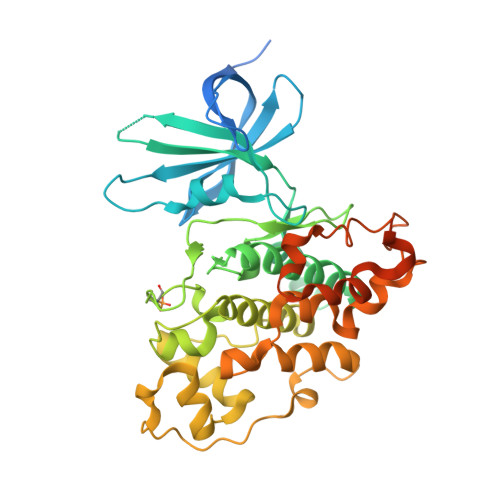Inhibitors of Glycogen Synthase Kinase 3 with Exquisite Kinome-Wide Selectivity and Their Functional Effects.
Wagner, F.F., Bishop, J.A., Gale, J.P., Shi, X., Walk, M., Ketterman, J., Patnaik, D., Barker, D., Walpita, D., Campbell, A.J., Nguyen, S., Lewis, M., Ross, L., Weiwer, M., An, W.F., Germain, A.R., Nag, P.P., Metkar, S., Kaya, T., Dandapani, S., Olson, D.E., Barbe, A.L., Lazzaro, F., Sacher, J.R., Cheah, J.H., Fei, D., Perez, J., Munoz, B., Palmer, M., Stegmaier, K., Schreiber, S.L., Scolnick, E., Zhang, Y.L., Haggarty, S.J., Holson, E.B., Pan, J.Q.(2016) ACS Chem Biol 11: 1952-1963
- PubMed: 27128528
- DOI: https://doi.org/10.1021/acschembio.6b00306
- Primary Citation of Related Structures:
5HLN, 5HLP - PubMed Abstract:
The mood stabilizer lithium, the first-line treatment for bipolar disorder, is hypothesized to exert its effects through direct inhibition of glycogen synthase kinase 3 (GSK3) and indirectly by increasing GSK3's inhibitory serine phosphorylation. GSK3 comprises two highly similar paralogs, GSK3α and GSK3β, which are key regulatory kinases in the canonical Wnt pathway. GSK3 stands as a nodal target within this pathway and is an attractive therapeutic target for multiple indications. Despite being an active field of research for the past 20 years, many GSK3 inhibitors demonstrate either poor to moderate selectivity versus the broader human kinome or physicochemical properties unsuitable for use in in vitro systems or in vivo models. A nonconventional analysis of data from a GSK3β inhibitor high-throughput screening campaign, which excluded known GSK3 inhibitor chemotypes, led to the discovery of a novel pyrazolo-tetrahydroquinolinone scaffold with unparalleled kinome-wide selectivity for the GSK3 kinases. Taking advantage of an uncommon tridentate interaction with the hinge region of GSK3, we developed highly selective and potent GSK3 inhibitors, BRD1652 and BRD0209, which demonstrated in vivo efficacy in a dopaminergic signaling paradigm modeling mood-related disorders. These new chemical probes open the way for exclusive analyses of the function of GSK3 kinases in multiple signaling pathways involved in many prevalent disorders.
Organizational Affiliation:
Chemical Neurobiology Laboratory, Departments of Neurology & Psychiatry, Massachusetts General Hospital, Harvard Medical School , Boston, Massachusetts 02215, United States.


















